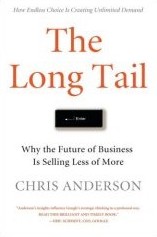Chris Anderson presents a compelling case of the “long tail” – the new economics of culture and commerce. He’s got the music CD, DVD and tons of data to back up his arguments that we’re entering the “long-tail” economy, brought about by the ubiquitous internet and cheap computer technology, enabling all of us to straddle between a “head” (mainstream taste) and “tail” – niche/custom taste. It’s a “culture unfiltered by economic scarcity.”
The three forces are 1) democratizing tools of production (PC), 2) cutting the costs of consumption by democratizing distribution (Internet), 3) connecting supply and demand (Google, Itunes).
The long-tail economy is of abundance, not scarcity that contributes to the demise of the 80/20 rule, which tends to correlate to a high-fixed-cost distribution/production model. As the traditional constraint of the fixed shelf space (tyranny of shelf and physical “atoms”), the pre-filter must be selective on what to offer and put on the shelf. This is no longer true if there is no shelves; all products are available – thanks to all the small merchants brought together by the power of Amazon and Google.
At the end, the author offers the “long-tail” rules: make everything available and help me find it. Specifically, 1) move inventory way in or way out, 2) let consumers do the work, 3) one distribution method doesn’t fit all, 4) One product doesn’t fit all, 5) One price doesn’t fit all, 6) Share information, 7) Think “and” not “or”, 8 ) Trust the market to do your job – Don’t predict; measure and respond. 9) Understand the power of free.
The impact of the Internet has transformed all of our lives. I didn’t think it would have this much impact on us so soon, turning several of the old industries (like newspaper, network TV) upside down. I’m now convinced this long-tail economy is for real. The opportunities are abundant but I wonder what this means to the future job skills our children must be trained for. Does it act as one giant roller that flatten/level the playing field and global economy so much that there is really no “high-paying” profession any more, as any of the premium will be squeezed out or arbitraged out? It’s a wonderful, scary time.

